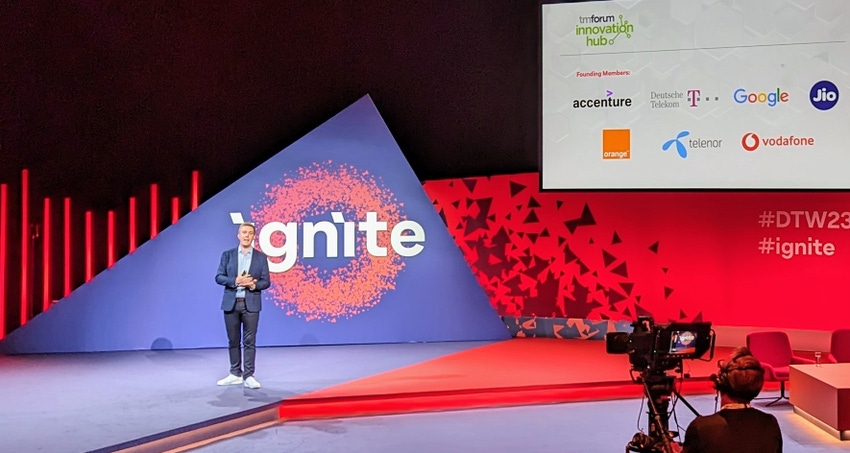DTW 2023 epitomises the telecoms industry’s struggle to evolve
The TM Forum’s annual jamboree kicked off by pleading for a greater sense of urgency from the telecoms industry to evolve, but took its time in doing so.
September 19, 2023

The TM Forum’s annual jamboree kicked off by pleading for a greater sense of urgency from the telecoms industry to evolve, but took its time in doing so.
DTW stands for Digital Transformation World, so a core, recurring theme of the event is the need for the industry to move with the times. Perhaps conscious of this Groundhog Day challenge, TM Forum CEO Nik Willetts (pictured) opened This year’s Copenhagen event by declaring a ‘code red moment’, which he characterised as a ‘call to arms’ for telecoms.
“To seize current opportunities, we have to change much more radically than we have over the past decade,” said Willetts, who then reverted to the main theme of last year’s event. “We have to work with companies like hyperscalers in a whole new way… They are allies, not competitors… It’s a three-year window and the clock is ticking… We are weighed down by decades of technology and processes.” The characteristics of that window were unclear.
Digital transformation as a concept feels increasingly tired and hackneyed. While that’s not the TM Forum’s fault, as the industry organisation most intimately associated with it, a significant proportion of the responsibility for keeping the idea fresh and useful falls at the feet of Willetts and co. It therefore felt like a missed opportunity that much of the rest of the opening keynote session was devoted to giving operator partners apparently unlimited opportunity to inflict corporate ‘death by PowerPoint’ on an audience required to pay attention from the uncivilised hour of 8:15 am.
A degree of scripting and corporate polish at an event such as this, with hundreds of people making the effort to fill the auditorium, is understandable, but it also serves to perpetuate a sense of business as usual, as opposed to radical transformation. The reiteration of the ‘telco to techco’ trope, which so often accompanies talk of digital transformation, further entrenched that vibe.
The first operator speaker – Manjot Singh Mann, CEO of M1 Singapore – said in conversation with Willetts that he was amused when he first encountered talk of ‘telco to techco’, as he had always assumed that was an intrinsic part of being an operator anyway. Having said that, his strategic answer to the recurring growth and margin challenges faced by nearly all operators seems to be a fairly generic digital transformation journey.
We then embarked on at least an hour of PowerPoint from several operators, two from Singapore alone, which represented a soporifically incongruous switch in narrative momentum after the urgency of the opening remarks. They eventually ceded the floor back to Willetts to allow him to chat to returning guest Adolfo Hernandez, head of telecoms at public cloud giant AWS. The theme was generative AI, which is probably the single most profound technological development since last year’s event. Hernandez was delighted to be asked about it since his company just happens to have made a major genAI announcement.
They then invited Shankar Arumugavelu, Chief Digital and Information Officer (CDIO) of Verizon, Harmeen Mehta, CDIO of BT group, and Scott Petty, who has yet to add ‘Digital’ to his boring old Group CTO title at Vodafone, to form a panel focused on genAI. Arumugavelu stressed the potential for it to improve productivity and Petty concurred, while stressing that genAI needs to have robust human guardrails around it.
Petty also ventured that if telcos are looking at genAI mainly as a way of cutting costs, for example through automating tasks we currently have to pay people to do, then they’re looking at it the wrong way. He seemed to be pushing back on the broader trend of operators freeing up cash by selling assets. Petty went on to highlight the network exposure trend as an opportunity to apply genAI in a more positive way, perhaps by catalysing the development of the requisite open APIs.
Now nearly three hours into the session, Willetts sought to squeeze in an on-stage chat with the founding members of its first newly unveiled Innovation Hub in Mumbai, India, which aims to be the physical manifestation of the long-standing TM Forum catalyst programme. Unfortunately this was one set-piece too far for the audience, half of which filed out while it was just getting going.
The content and scheduling of the opening keynote-fest at DTW 2023 provided a, presumably inadvertent, metaphor for the challenges the TM Forum is so keen to highlight. There was lots of worthy talk of agility, fast-failing, etc, but momentum was soon lost as the session fell back on reassuringly familiar and abstract buzzwords. But it did conclude with the hope that the massive disruption promised by genAI may finally impose the digital transformation our industry has long been pontificating about, so long as we can control it, that is.
Get the latest news straight to your inbox. Register for the Telecoms.com newsletter here.
About the Author(s)
You May Also Like








.png?width=300&auto=webp&quality=80&disable=upscale)


_1.jpg?width=300&auto=webp&quality=80&disable=upscale)


.png?width=800&auto=webp&quality=80&disable=upscale)